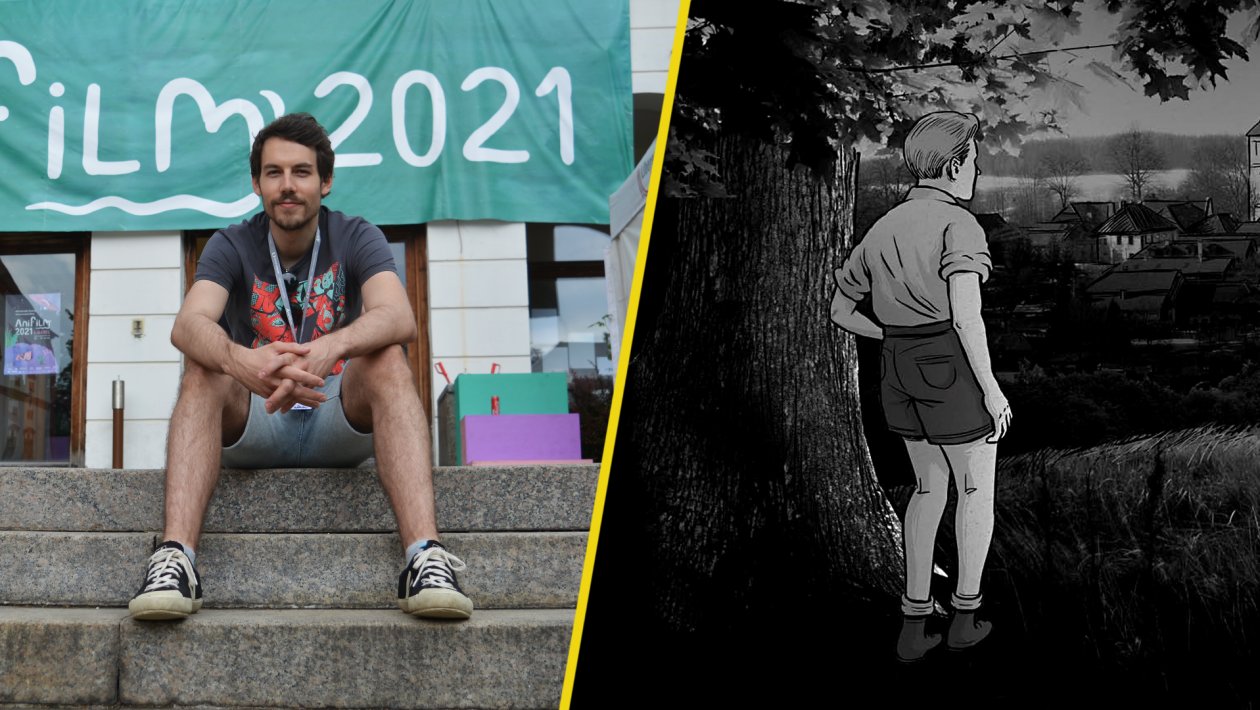The player must form his own opinion, says the author of Svobody 1945 -apkrig
The latest work of the authors of the game Attentat 1942 and basically the first game of the Charles Games studio itself is approaching release. We are talking about the title Freedom 1945, which will arrive on August 3, and the launch date was coincidentally announced at the time of the Anifilm, from which we brought you an extensive report a few days ago. And since Ondřej Paška, the programmer of Svobody 1945, also visited the festival among other developers, there was an ideal opportunity to interview him and learn more about the final phase of development.
What has changed on your side since the time of Attentat 1942?
We are more experienced in everything. And most importantly, we have more space to devote to it. The assassination originally took place at Charles University, and it was only at the beginning of last year that we set aside as a separate studio, Charles Games. Now we can devote ourselves fully to work as an independent company and we also have greater opportunities, for example in marketing. We realized how important marketing is, because even now many people have never heard of the Assassination, even in the Czech Republic, even though we have won a lot of awards. So marketing helped us run sales and the Assassination is still holding on, so I hope that Svoboda 1945 will support it in retrospect.
How would you describe your upcoming game yourself? What about the length and its overall range?
The game takes place in the village of Svoboda, located on the border, where the past of post-war events – both the liberation and the expulsion of the German population and the onset of communism – still falls on people. The player goes to the village as a conservationist, who has to decide on the granting of monument protection for the local school, and can ask individual residents. We try not to force the player to see everything, it’s about what interests the person and what he wants to know. It’s up to the player which of the stories he wants to explore and how in depth. So if a person tries to finish the game as quickly as possible and does not actually look for all things, he can get to the end relatively quickly, for example within two hours. But if he really wants to go deep, it can take him even three hours to finish. In addition, there is an encyclopedia where the player can learn more about the events mentioned in the game and other facts if he is interested. In the game, the information is always conveyed through a character who therefore has his own view of the thing and does not have to look at everything completely objectively. Everyone is right and the player must come to his own opinion while playing.
What do you consider to be the greatest advantage or improvement over the Assassination, either technologically or by development itself?
Freedom was actually created in our own plugin to Unity, in the Charles Engine, so technically we moved on as best we could. This means that all the comics have better quality, also all the videos are better, but I’m probably most happy that we managed to expand all those elements and tightento make as much sense as possible. We have a whole new game map where one can move, visit individual characters or explore the memories he has already discovered in those people. In essence, it is a possibility of a retrospective look at past events, including our own notes, which we get to through that map with a completely new concept. And then there are the individual mini-games, which we call more precisely the interactive memories that the player acquires through conversations with individual people, goes back to the past through them and can be faced with some difficult decision. For them, I’m glad that we managed to create new interesting game mechanics, quite original in my opinion, which in our case do not test any reflexes, no logical thinking, but force themselves to empathize with a particular character and make decisions based on empathy, for example. he wanted to behave himself in the given situation. This is probably the biggest change in the game system, in my opinion it also managed to connect well and the result works better than in the Assassination.
The Assassination was already based on cooperation with historians, it is no different now, but has your cooperation changed in any way based on previous experience or a slightly different topic and time period? Who did you address this time?
A great deal of research was already going on when the Assassination took place, and the game was planned for a long time. Of course, we continued to deal with historians, for example, interactive memories and other little things that players in Svoboda will come across. I can reveal, for example, that we were dealing with the yield from one field of wheat in 1947, how much a tractor could cost in 1948, or that workers’ wages were around ten crowns an hour, of course before the currency reform. It’s very difficult to create anything from that time, because it was pretty wild in everything, so we still had a lot of questions for historians. Historians from the Academy of Sciences have been helping us all the time, specifically Mgr. Marie Černá, Ph.D. Mgr. Jaroslav Cuhra, Ph.D .; PhDr. Jiří Hoppe, Ph.D .; PhDr. Stanislav Kokoška, Ph.D. and from the Faculty of Arts of Charles University Mgr. Jaroslav Pinkas, Ph.D. or Mgr. Kamil Činátl, Ph.D.
Interaction with characters is often mentioned, which is not surprising when interviews with them and related film sequences are the most prominent part of the game. Have there been any changes here regarding their work?
These scenes were filmed together with the Assassination, it went quickly, so we’ve had them ready for a while. The difference is that we addressed the actors of the Brno theaters, from the National Theater Brno and Husy na Provázku, while only amateur actors performed in the Assassination. And even though it had a certain charm in our previous game, I think the change is really visible.
How many people actually participated in Svoboda?
Our team works almost entirely remotely, graphics and sound are created externally, but let’s say that Svoboda was created by a total of six people. Although we became independent, we more or less stayed in the same composition as before, we did not start accepting more people. Except for the testers, therefore, everything remained the same.
When you deal with Czech history as part of your titles, do you solve already during the development how foreigners can potentially perceive it, do you take any, if so to speak, considerations for them?
We also collaborate with a historian from the United States, who translates parts of the play into English. However, he does not translate in a way that he would translate word for word, but he also tries to get a context into the English text, which is missing in English-speaking countries due to the absence of Czech realities. Of course, people here know what a collective farm or the StB is, but it wouldn’t make much sense to foreigners, so we basically wanted such a cultural-contextual translation that foreign players would not feel lost in the game. We had to bring our country and our history a little closer.
How did you actually perceive the foreign responses already in the case of the Assassination? In addition to the fact that the game helped to suppress Nazi censorship in video games in Germany, you had even won the prize for the best game at the A MAZE festival in Berlin before, although the game could not even be presented there. What else in the world where our history is more distant?
For example, we recorded a super let’s play from Japan. Overall, people caught on to the story, the human emotions, but it wasn’t entirely clear to us how much they perceived the historical component, if they were interested at all. We try to make the game work on a human level, to make the whole human story catchy and interesting enough, and not just to entertain a person who is a fan of history. The experiences from the game are really quite different when it is played by a Czech and when it is played by a foreigner, there is no doubt about that. On the other hand, we had a great review from England in a podcast with a historian who seemed to know at least as much as our historians know about it, as it deals with the Protectorate and the time around. To this he added various stories from the assassination of Heydrich or other things that were said in the game, so even such can be a foreign view of our game.
Given that Freedom began to emerge in parallel with the Assassination, do you have any further plans for the future at this time? Are you planning a different time or a complete change of genre?
For a start, we plan to port Svoboda to other platforms, which will actually be our first attempt, and to further support the game to make it as successful as possible, then it remains to be seen. We don’t have any specific plans for other historical games now, but if we want to do something, we can immediately use our newly acquired experience. But it’s not like we’re not doing anything – we work externally for other companies, as recently, in collaboration with People in Need as part of the One World in Schools project, a little game about cyberbullying called DigiStories: Nela was created. We are also choosing smaller side projects in cooperation with other companies, we will continue to do so, but mainly we hope that Svoboda will catch on and that we will be able to develop other similar games, even in a different style. We’ll see.



